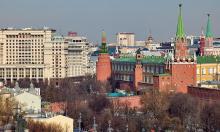The USA prepared to exclude Libya from the axis of evil
Colonel Gadhafi is not willing to share Saddam Hussein's fate and wait for another bombing attack to occur
The information, which can probably be referred to as sensational, has been recently received from Libya. The head of the international committee of the US Senate, Richard Lugar, visited the country, which has been on top of the list of so-called cast away countries only a short time ago. The US senator promised that Libya would be relieved of all international sanctions. Libyan leader, Moammar Gadhafi, invited US President George W. Bush to visit Libya in return. It is not ruled out that it goes about the intention of the US administration to cut the number of countries included in the notorious “axis of evil.” 
The US senator's visit to Tripoli has become a significant event in world politics: US high-ranking officials visited Libya last time 25 years ago. Colonel Gadhafi announced the establishment of the new regime to oppose the USA and stood up for Palestine, which ruined Libya's relations with the USA.
A disco bar, which was popular with American military men, blew up on 5 April 1986 in Western Berlin. The bomb killed three people. In return, Ronald Reagan's administration ordered to bomb the Libyan capital of Tripoli on April 16: tens of thousands of people were killed in the bombing. On 21 December 1988, PanAmerican flight 103 blew up over Lockerbie in Scotland, killing all 259 people on board and eleven people on the ground, when the plane crashed. The US administration accused the Libyan administration of the terrorist act again. US officials started saying that Gadhafi was willing to create nuclear weapons and help terrorism. As a result, Libya joined Iraq, Iran and North Korea on the list of the cast-away countries. The UN was forced to impose international sanctions against Libya under the US pressure. Libya, one of the largest oil exporters in the world, was deprived of an opportunity to export oil, which seriously aggravated the economic situation in the country although it seemed to be quite favorable before.
Gadhafi's statements were becoming more and more bellicose with time, while the economic crisis in Libya was worsening. The USA refused to mitigate the sanctions, emphasizing Libya's wish to help terrorists. Libya was suffering up to $30 billion of losses from the crisis.
Everything changed in February of 2001, when a Dutch court finished the trial connected with the explosion of the US airliner above Scotland. One citizen of Libya was sentenced to life in prison, the other one was acquitted. Four defendants were sentenced to serving different terms in jail in November of the same year, when a German court closed the case of the explosion in a disco bar in Berlin. One of the defendants held the Libyan citizenship, whereas another one was a German citizen of Libyan origin. However, the investigation of the two tragedies did not prove Colonel Gadhafi's personal implication in the terrorist acts. The colonel, however, found some time to condemn the 9/11 terrorist attacks.
Negotiations took a different turn afterwards. The West was interested in the talk process on account of the growing prices on oil, Libya was suffering from a heavy burden of economic sanctions. In December of 2003, Gadhafi stated that Libya was prepared to shut down all military programs. The colonel invited inspectors of the International Atomic Energy Agency to visit the country and agreed to pay compensations to victims of the Berlin explosion and set out his readiness to consider an opportunity to compensate those who lost their relatives in the air crash in Scotland.
When Colonel Gadhafi announced such intentions, he had an opportunity to meet British Prime Minister Tony Blair, German Chancellor Gerhard Schroeder, French President Jacques Chirac, Prime Minister of Canada Paul Martin and Italian Premier Silvio Berlusconi. American officials were not mentioned on the list: the USA had special relations with Israel. The United States eventually decided to resume diplomatic relations with Libya in June of 2004, and did not object to a partial withdrawal of UN sanctions.
Gadhafi asked for compensations to those people, who suffered in the bombing of Tripoli, but the USA has not expressed its consent on the matter yet. Libya criticized the US-led war in Iraq. Colonel Gadhafi said at the meeting of African leaders that Africa should determine its politics and fight against poverty without waiting for any donations from the West. The USA still boycotts a possibility to cancel the sanctions against Libya, but the progress is obvious.
It is not ruled out that the visible improvement of relations between the USA and Libya is simply based on the pragmatic interest. The Bush's administration probably wanted to show both its electors and the whole world that it could work not only with sticks but with carrots as well. They only needed to achieve certain diplomatic progress in Libya and let the Libyan oil appear on the market to cut the growing prices. Gadhafi is not willing to share Saddam Hussein's fate and wait for another bombing attack to occur: the Libyan leader had to come to a compromise too.
Nevertheless, it is too early to say that the US-Libyan relations have been normalized. USA's major ally in the Arab world – Saudi Arabia – accused Libya of its implication in the attempted assassination against the current king of the nation during the time when he held the crown prince title. The CIA and the FBI started their own investigation on the matter, which could be interpreted as an escape clause for the USA to crack down on Libya again, if necessary.
Ivan Shmelev
On the photo: Colonel Moammar Gadhafi
Subscribe to Pravda.Ru Telegram channel, Facebook, RSS!




